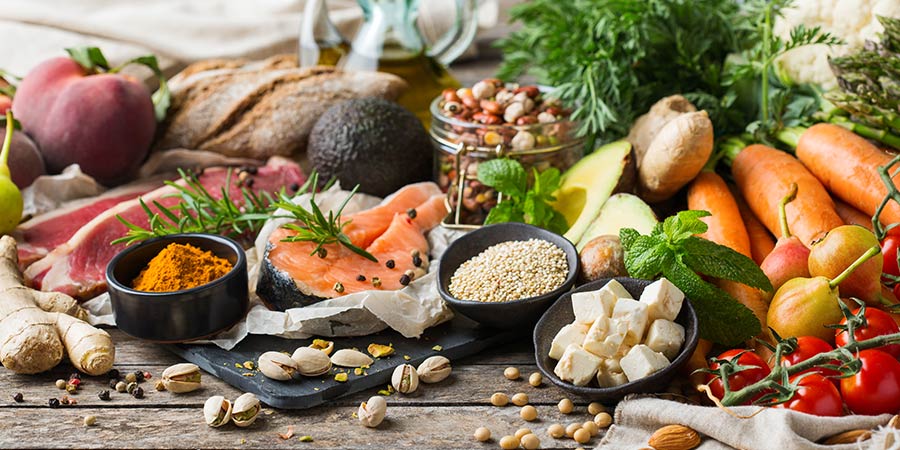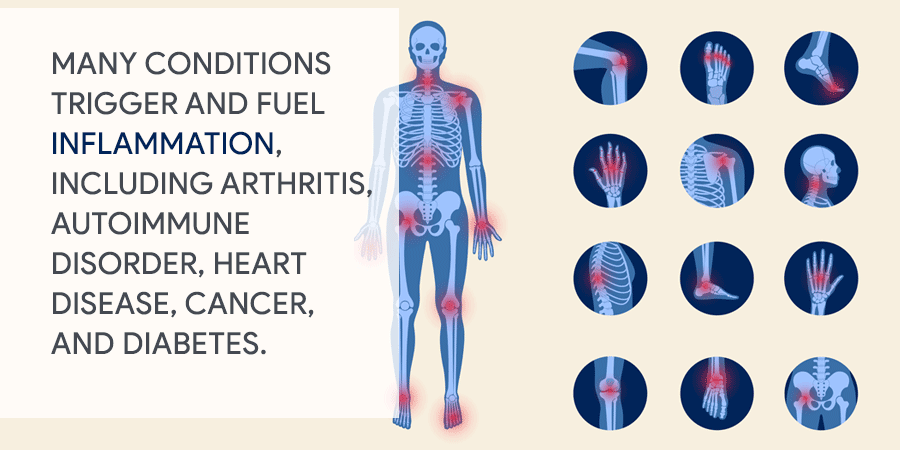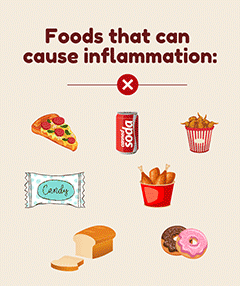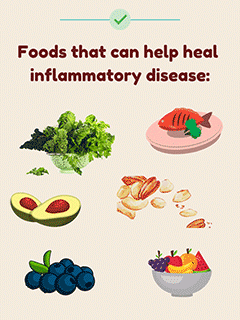One of the most reliable ways to reduce inflammation rests not in the medicine cabinet but in the foods you eat.
Inflammation is not necessarily a bad thing because it helps the body fight illness and harm. In most cases, inflammation plays a fundamental part in the healing process. However, the healing process does not work as it should for those with a compromised immune system and a persistent or recurrent low-level inflammation. Fortunately, there is concrete evidence that dietary decisions may help manage adverse symptoms.
An anti-inflammatory diet is more of a lifestyle than a specific regimen. Choosing to exercise, eat right, and get enough rest could significantly improve the quality of your life, including reducing pain issues, providing you with more energy, and elevating your mood.
Anti-inflammatory Diet Positive Health Effects
Inflammation occurs when your immune system becomes activated by the invasion of anything that is foreign—such as an invading microbe, plant pollen, or chemical. Sporadic sessions of inflammation directed at alarming invaders occurs to protect your health. However, sometimes the inflammation process continues, even when a foreign invader is not threatening your health. That’s when inflammation becomes an issue rather than a practical part of healing.
Many conditions trigger and fuel inflammation, including arthritis, autoimmune disorder, heart disease, cancer, and diabetes. Other events can also lead to this condition, such as infection, injury, long-term exposure to chemicals, smoking, obesity, and stress. In fact, studies have shown that specific ingredients of foods or beverages may have inflammatory or anti-inflammatory effects.
Choosing the right anti-inflammatory foods may significantly reduce your risk of several illnesses, while consistently choosing the incorrect ones could lead to many health-related dangers and diseases.
 Foods That Can Lead To Chronic Inflammation:
Foods That Can Lead To Chronic Inflammation:
- Refined carbohydrates, such as white bread, pizza, and pastries
- Fried foods like French fries
- Sugar-sweetened beverages, like sodas and sugary sports drinks
- Red meat and processed meat products like hot dogs and sausage
- Fats such as margarine, shortening, and lard
It is essential to understand that most foods above are associated with an increased risk for type 2 diabetes, heart disease, and chronic inflammatory disease; not surprising since continuous inflammation is a physical response to the above foods that increases the risk of developing these diseases.
Anti-inflammatory Foods Examples:
Several foods are known to have anti-inflammatory properties. Including those high in antioxidants and polyphenols. Some of these foods are:
- tomatoes
- olive oil
- leafy vegetables like kale and spinach
- nuts
- fatty fish, like salmon, sardines, and mackerel
- fruits such as strawberries, blueberries, and oranges
Benefits of an Anti-inflammatory Diet
Fruits, nuts, and vegetables such as blueberries, almonds, and leafy greens are naturally high in antioxidants and polyphenols, which are great inflammation reducers and aid in lowering the risk of cardiovascular disease and diabetes. Additionally, coffee has polyphenols and other anti-inflammatory compounds that may also protect against inflammation. One of the best examples of a healthy anti-inflammatory eating plan is the Mediterranean Diet.
Healthy Diet Tips:
- When choosing an entree in a restaurant, try salmon, which is readily available and rich in omega-3 fatty acids.
- If you like rice, choose whole grain, which is packed with healthy fiber.
- Carbohydrates such as beans and legumes are much healthier than potatoes and can also help fight the inflammatory process.
- Use a full-fat yogurt, such as Greek yogurt, as a replacement for sour cream in recipes.
- If you have a craving for sweets, try eating some berries or a piece of dark chocolate containing antioxidants.
- When possible, add herbs and spices such as turmeric, ginger, cinnamon, and chili powder to your recipes.
- Green tea is high on antioxidants and often a better option than traditional iced tea or sodas.
Changes in Lifestyle Habits
Although a healthy diet promotes a reduction in inflammation as well as helps prevent the development of chronic long-term diseases, it is not all you need to do to maintain a healthy life. Stopping the inflammatory process and the prevention of long-term chronic diseases requires consistent and productive lifestyle changes.
Some of the most valuable healthy lifestyle habits are:
- Stop smoking
- Limit or avoid alcohol consumption
- Keep a low-fat diet
- Avoid processed foods
- Maintain an exercise routine
- Get enough sleep
- Maintain a healthy weight
- Find effective ways to manage stress
It is possible to transform the short-term inflammatory process and the quality of your current and later life by changing some not-so-healthy habits today. Adopting more beneficial lifestyle choices, even small measures drastically reduce the risk of chronic inflammatory disease.
As an example, choosing up a daily 10-minute walk most days and skipping processed foods can immediately start reducing inflammation. This is a significant part of the healing process, especially when focusing on inflammation and obesity; as you start losing weight with the help of diet and exercise, your body responses change, and inflammation decreases. These small changes inevitably lead to extensive and positive changes over time.
Conclusion
Choosing a diet high in fruits, vegetables, nuts, whole grains, fish, and healthy oils can have a remarkable impact on your physical and emotional health. Managing your stress, daily exercise, and following a lower-inflammation diet may greatly reduce your risk for heart disease, certain types of cancer, and inflammation. Speak to your doctor, make a plan that fits your specific health needs and follow a path to a healthier and happier life.
Did you know that proper nutrition can also significantly reduce the discomforts of withdrawal and the intensity of cravings? It is extremely important to address your existing diet and nutritional deficiencies when trying to recover from alcohol and drug abuse. This is why our chefs at Domus Retreat are there to prepare healthy meals that cater to your specific dietary needs.
Sources:
- Harvard Health Publishing: Foods That Fight Inflammation
- Harvard Health Publishing: What is Chronic Inflammation?
- National Institute of Environmental Health Sciences: Inflammation
- Mayo Clinic: Mediterranean Diet for Heart Health
Call now to speak confidentially with an addiction expert.
Committing to overcome addiction should not have to mean relinquishing comfort, privacy, or self-respect. Why not experience individualized care and comfort? If you're ready to take part in a world-class private treatment program, it's time to call Domus Retreat.Call 1-866-713-3869
This article authored and reviewed by Clare Waismann, M-RAS, SUDCC II, Founder of Waismann Method Advanced Treatment for Opiate Dependence and Domus Retreat, is for informational purposes only and should not be considered medical advice or a recommendation. Consult a healthcare professional for guidance and treatment options. While we strive to maintain high editorial standards, please be aware that information may become outdated. Domus Retreat, its employees, agents, and associated individuals are not liable for any errors, omissions, or consequences resulting from the use of the information provided.




 Foods That Can Lead To Chronic Inflammation:
Foods That Can Lead To Chronic Inflammation:
















